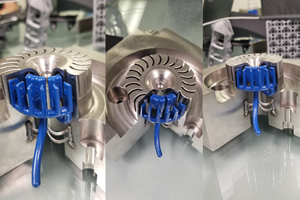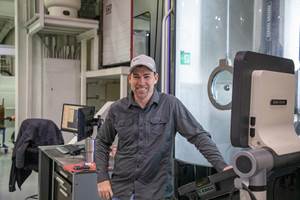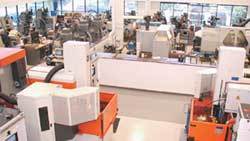Tech Mold Inc.: A Constant State of Flux
Embracing change and continuous evolution—in conjunction with fine-tuning its specialty over the years—is this moldmaker’s formula for long-term success.
It was a different world when Tech Mold, Inc. (Tempe, AZ) was profiled 10 years ago in September of 1998. According to some industry surveys, approximately 20 percent of mold shops that existed in 1998 have gone out of business due to the recession of 2002 to 2004. While Tech Mold has undergone some dynamic shifts over the past 10 years, which included breaking away from its long-time affiliation with the Tech Group (now owned by the West Corp.) to becoming a totally independent, privately-held company dedicated to full-service mold manufacturing, Tech Mold remains in the forefront of global high-tech mold manufacturers in the United States, thanks in large part to Bill Kushmaul’s continued dedication to technology.
Ten years ago, Kushmaul, Tech Mold’s CEO, commented that in order for companies “to be around in 10 or 15 years” they’d “have to spend a tremendous amount of money” to stay in the game. While Tech Mold has always been on the cutting edge of adopting machine tool technology, today, Kushmaul believes that it is more important than ever. However, “keeping up with technology has been a real financial challenge,” he comments.
Full-Service Solutions
Several years ago, the company opened a prototyping facility, Tech Mold R&D, to take advantage of developmental prototype technology and the opportunities that can be gained from getting into a program at the conceptual stage. “We want to help customers with new product development; to design and build single-cavity molds quickly so that new products can get to market in optimum time,” Kushmaul says. “This then leads to bigger projects with larger, multi-cavity molds for long-term production.”
Tech Mold’s business strategy has evolved into one of “full service with total solutions” including program management, mold design, mold build and mold qualification. This can include the full integration of the molding press and robotics, allowing Tech Mold to ship complete turnkey manufacturing cells. Tech Mold also provides low-volume pre-production runs and services after the mold build that include making any engineering changes or modifications that the customer requires.
“Customers are demanding these types of full-service solutions from conceptual prototypes to service after the sale,” says Kushmaul. “Because of our ongoing efforts to always exceed our customers’ requirements we are now capable of developing fully-approved, complete molding systems and putting them into production for our customers.”
Specializing in technology also includes Tech Mold’s evolution into the newest types of mold technologies, some of which had not arrived on the manufacturing scene 10 years ago, or were just beginning to be noticed. Over the past 10 years, Tech Mold has developed expertise in building precision multi-cavity molds for multi-function molding—a growing market segment for the company—and rotating stack molds that also can provide a number of in-mold operations such as in-mold labeling and in-mold assembly. All of this technology is an effort to help customers reduce the overall cost of their product and minimize the need for downstream automation and secondary operations.
From Past to Present
A decade ago, Kushmaul said that Tech Mold’s goal was to “increase planning and to decrease the labor content” to an “ideal labor content under 20 percent” in order to remain competitive. Today, the company said that number is achievable with the right mix of work, “when we’re afforded the luxury of building multiple molds or large multiple-cavity molds,” he notes. Recently, Tech Mold finished a very large project that required manufacturing more than 700 cavities. The company was not only able to achieve the 20 percent goal that Kushmaul had set, but to do even better.
“The volume of work is being reduced in the industry, and we’re seeing more individual molds or smaller programs on which we often can’t utilize that technology to the extent we can on large programs.”
While he continues to believe that automation is key to that goal, Kushmaul says that mold building will never be a process that can be completely automated. “We’ll never reach the point where we can put a chunk of steel in one end and a mold comes out on the other,” he says. “We’ll always need dedicated, skilled and talented professionals such as mold designers, programmers, machinists and moldmakers to achieve what we need to for our customers.”
Scheduling is one aspect of automation that should not be overlooked, but tends to be one area that is often “given too little consideration,” Kushmaul noted 10 years ago. To address that issue at Tech Mold, the company implemented the Epicor manufacturing package/program that provides real-time scheduling for every facet of the mold manufacturing process. “By adopting this system, our on-time delivery has become dead-on,” says Kushmaul.
Beyond Today
Where will Tech Mold be in another 10 years? The future of Tech Mold—and indeed U.S. mold manufacturing generally—Kushmaul believes, will be as mold specialists. “China is forcing us to be specialty companies because they are taking the work that requires doing things the same way,” he says. “The days of doing it all are over. If a market is consistently there and is profitable, they’ll take it. In order to survive, we will need to be constantly in flux, changing and specializing.”
Kushmaul says that it’s already happening: as soon as something gets popular and profitable, the Chinese manufacturers begin mass producing and selling it. “The only companies making it are those who reinvent themselves,” he adds. “It will be difficult to do the same thing year-after-year. The changes will be happening faster and we’ll have to adapt to changes in technology and invent new ways of making a living.”
With today’s customers demanding more and expecting more from their mold suppliers, Tech Mold has become more stringent and sophisticated in monitoring not only its own internal Best Practice procedures but is reaching out to its suppliers and asking more from them, all in an effort to drive out cost from the mold manufacturing process. And, says Kushmaul, “this ongoing type of review will only serve to make us a better company in the years to come.”
|
A Decade of Difference
|
Related Content
Laser Welder Yields Fast, Precise Mold Repair
Intralox's integration of the Alpha Laser ALFlak has significantly improved their tool room efficiency when it comes to difficult welds and urgent repairs.
Read MoreLarge Hybrid Steel Insert Solves Deformation, Dimensionality, Cycle Time Problems
DMLS printers using metal additive powders selected by Linear AMS to produce high-quality, accurate, consistent 3D-printed mold components with certification and traceability.
Read MoreCT Scanning Helps Micro Molder Reduce Cost of First Article Inspections
CT scanning services performed by 3D ProScan, a division of NyproMold Inc. provides MTD Micro Molding with accurate, high-resolution internal and external measurements performed about seven times faster and at significant cost savings.
Read MoreSpeed, Productivity Gains and High Uptime Ease Decision for Second Five-Axis Machine
Byrne Tool + Design reduced setups and gained speed and productivity thanks to fast, accurate and compact five-axis CNC machining centers.
Read MoreRead Next
Courtesy Mold & Tool/REXAM Mold Manufacturing: Change is Good!
Over the past decade this turnkey shop changed ownership and thrives with a focus on high cavitation, tight tolerance molds.
Read MoreHow to Use Strategic Planning Tools, Data to Manage the Human Side of Business
Q&A with Marion Wells, MMT EAB member and founder of Human Asset Management.
Read MoreHow to Use Continuing Education to Remain Competitive in Moldmaking
Continued training helps moldmakers make tooling decisions and properly use the latest cutting tool to efficiently machine high-quality molds.
Read More




















